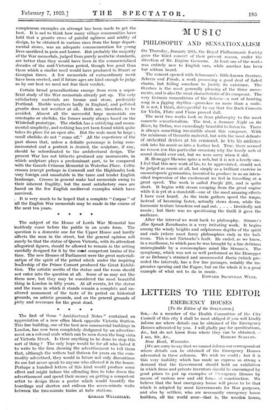'MUSIC PHILOSOPHY AND SENSATIONALISM
ON Thursday, January 29th, the Royal Philharmonic Society gave the third concert of their present season, under the direction of Mr. Eugene Goossens. At least one of the works was entirely new to English ears, while another has been ' but seldom heard.
The concert opened with Schumann's little-known Overture, Scherzo and Finale, a work possessing a good deal of faded charm, but failing somehow to justify its existence. The Overture is the most generally pleasing of the three move- ments, and is also the most characteristic of its composer. The very German romanticism of the Scherzo—a sort of hunting song in a jigging rhythm—provokes no more than a smile. It is not, I think, disrespectful to say that the Bach concerto for Violin, Flute and Piano proved dull.
The next two works took us from philosophy to the most concrete sensationalism. The first, a Summer Night on the River, by Delius, was exceedingly beautiful to listen to. There is always something irresistible about this composer. With the minimum of thematic material, but with the most delicate of orchestral devices at his command, he lets his audience sink into his music as into a feather bed. True, there seemed no reason (on this particular occasion) why the lovely web of sound should ever end, but we were sorry when it did.
M. Honegger likewise spins a web, but it is not a lovely one. I feel that this new work of his, to be appreciated, should not be judged as music at all, but simply as a brilliant exercise in onomatopoeic gymnastics, invented to produce in us an inten- sified impression of the excitement we feel in travelling at a great speed. The work is allied Pacific 251, and is quite short. It begins with steam escaping from the great engine while it is yet at a standstill—one of the most amazing effects I have ever heard. As the train gathers speed the tempo, instead of becoming faster, actually slows down, while the
harmonic texture broadens out and out Decidedly not music ; but there was no questioning the thrill it gave the audience.
After the interval we went back to philosophy. Strauss's Also Sprach Zarathustra is a very irritating work. It begins among the windy heights and sulphurous depths of the spirit . and ends (where most, fancy philosophies end) in the ball- room. This is not Nietzsche's fault. He ended, as we know, in a madhouse, to which pass he was brought by a fine delirium unimaginable by a commonplace mind like Strauss's. The symphony, which was not as well performed as the Honegger or as Debussy's strained and unsuccessful Iberia (which pre- ceded the interval), has a few fine passages, notably the im- pressive opening and the Fugue, but on the whole it is a good example of what not to do in music.
EDWARD SACKVILLE WEST.










































 Previous page
Previous page